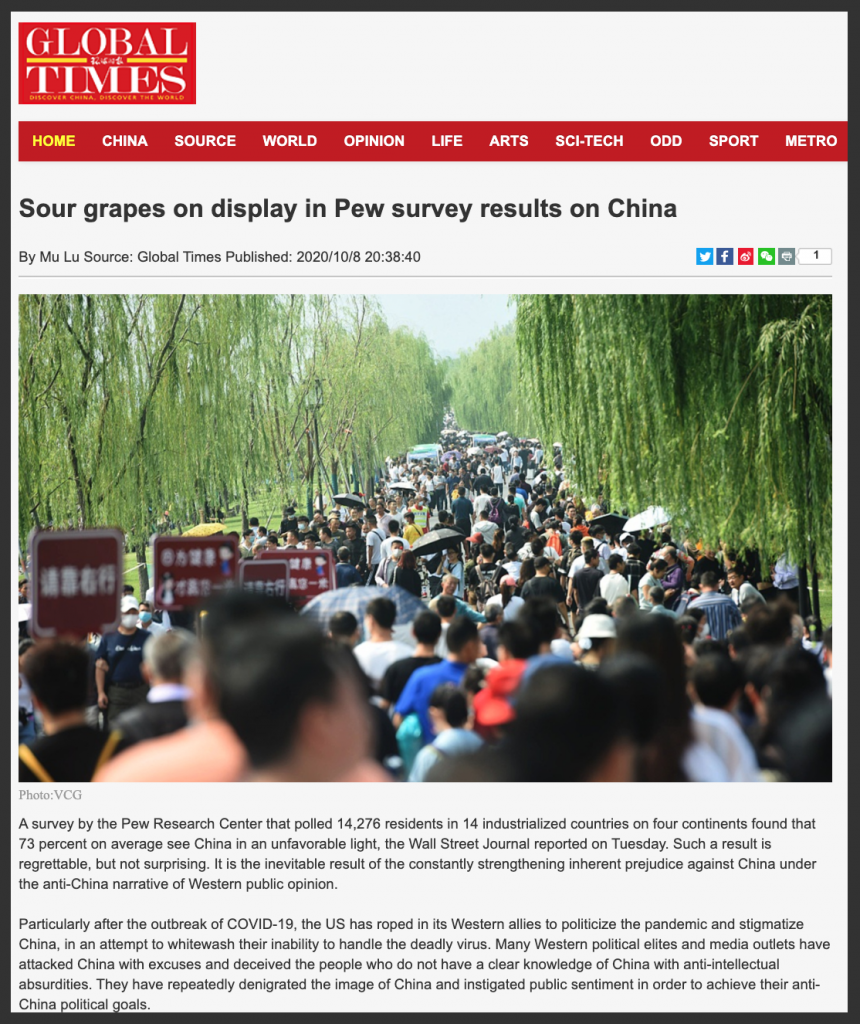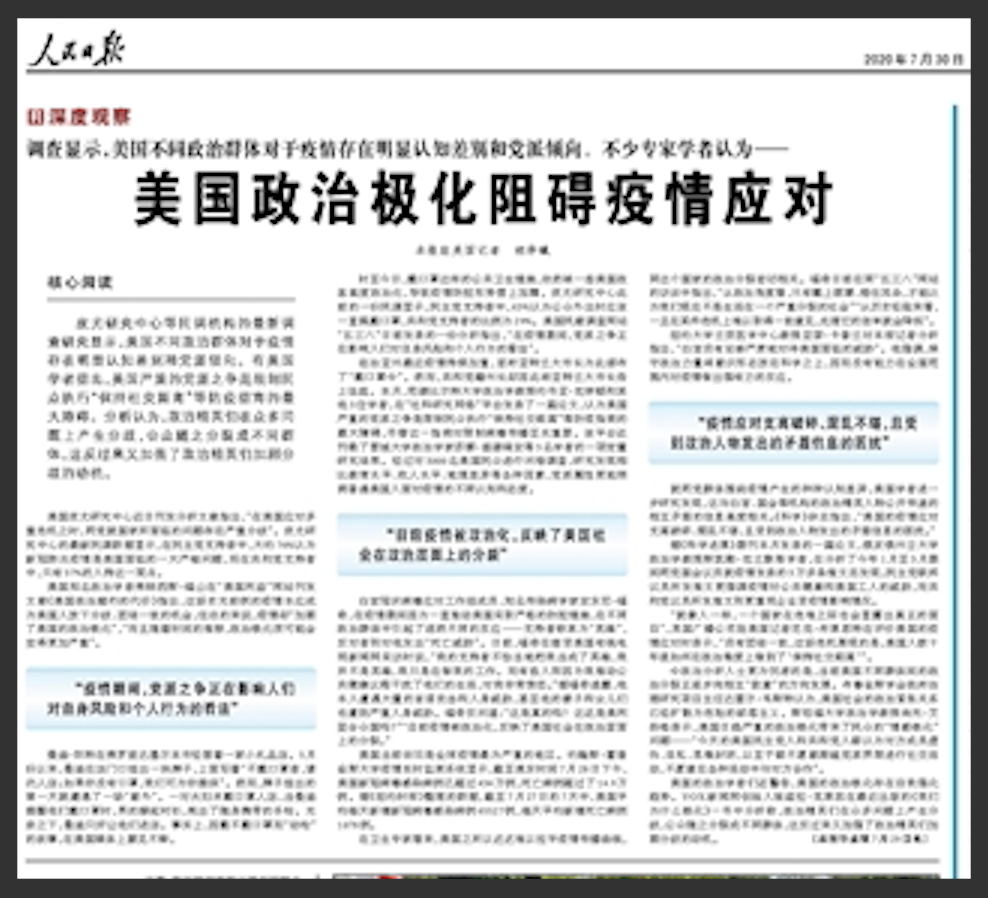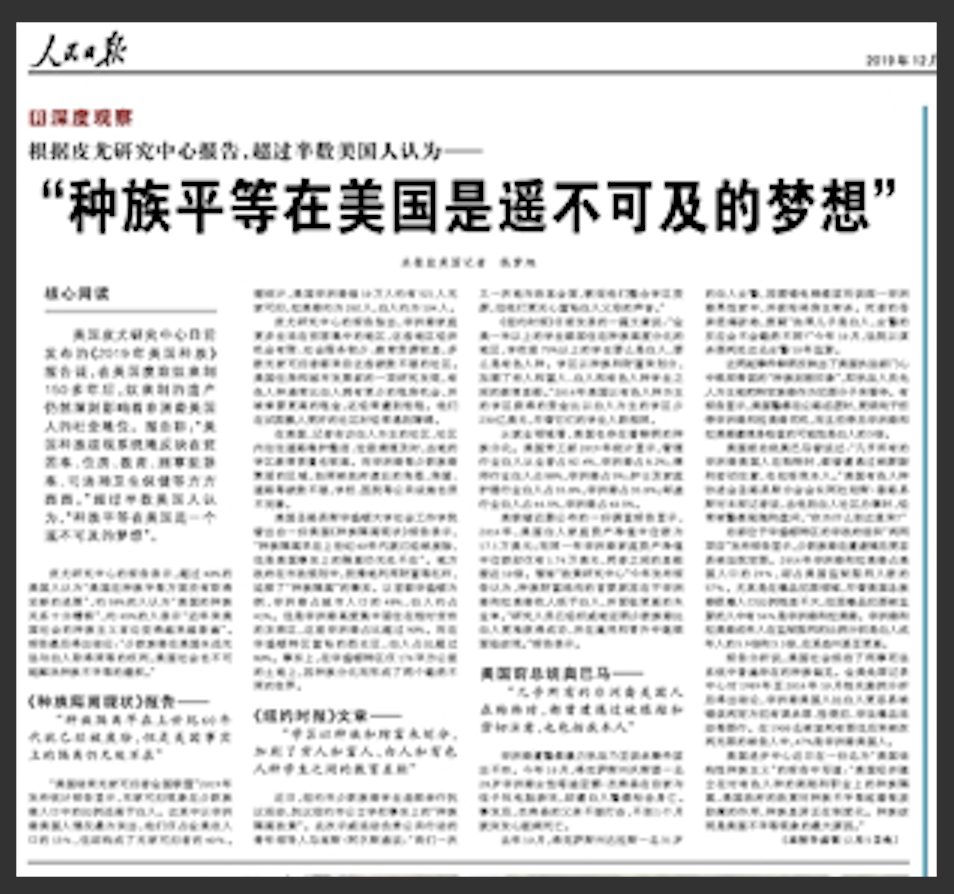
Image by Born1945 available at Flickr.com under CC license.
Earlier this week the Pew Research Center, a non-partisan think tank in the US, released a survey of 14 countries in Europe, Asia and North America showing that negative perceptions of China have reached their highest point since Pew began such surveys more than a decade ago. The survey noted that unfavorable opinion about China has “soared” in 2020. “Today, a majority in each of the surveyed countries has an unfavorable opinion of China,” it said.
The survey suggests Xi Jinping — who himself comes off very poorly in the survey — could face real obstacles in his efforts to expand China’s global influence, and might find cooperation impeded even on issues where the Chinese Communist Party’s positions align with those of other countries.
Is China likely to re-think its recent policies and approaches, including its more aggressive approach to diplomacy? Don’t hold your breath.
The Global Times, a commercial spinoff of the CCP’s official People’s Daily, fulminated against the Pew survey yesterday, dismissing the results as “the inevitable result of the constantly strengthening inherent prejudice against China under the anti-China narrative of Western public opinion.” The US had “roped in” its allies, the article said, seeking to “stigmatize China,” and to “whitewash their inability to handle the deadly virus.”
Never mind that the US fared even worse in the Pew survey, with a median of 84 percent saying the US response to Covid-19 had been poor.
Not only had Westerners been “blinded” by “mainstream Western outlets” infected with prejudice, according to the Global Times, but there were fundamental problems as well with this “clearly biased poll.”

But party-state media have not always been so dismissive of polls from Pew. In fact, official media in China routinely rely on experts and media in the West, implying their credibility, to bolster official propaganda positions — and the Pew Research Center has been no exception.
Back in July, the People’s Daily ran a large report in its international section called, “Political Extremes in America an Obstacle to Covid-19 Response,” which drew liberally from the publicly stated views of scholars such as political scientist Francis Fukuyama, journalist and Vox co-founder Ezra Klein, and Darrell M. West, director of the center for technology innovation at the Brookings Institution. The report, filed from Washington, painted a picture – not altogether untrue – of a country deeply divided against itself, and incapable of agreeing on life and death matters in the midst of a global pandemic.

The authority of the sources cited in the report, all American, was taken for granted in this case. And the report began by quoting Pew: “The most recent surveys conducted by the Pew Research Center and other polling agencies,” it said, “show that different political groups in the US show obvious perceptual and party-line differences regarding the epidemic.”
In December last year, another lengthy report in the international section of the People’s Daily underscored racial divisions in the United States, which drew entirely on an April 2019 Pew study called “Race in America 2019.” The People’s Daily report noted, on the basis of the Pew study, the many ways that racism in the US was felt in areas ranging from poverty, education, housing and crime. The article quoted former President Barack Obama, and even singled out a report from the New York Times – a news source frequently singled out by Chinese state media for allegedly “blackening China’s name,” or for “aiding anti-China forces.”

Pew and other Western sources have even been used to shore up the arguments of the People’s Daily’s chief voice on international affairs, the CCP penname “Zhong Sheng” (钟声). Back in February, as the Covid-19 epidemic in China was in full swing, the column fulminated – as it has almost incessantly this year – against “certain US politicians” who “attack China and the Chinese system.” The commentary, called “Ideological Prejudice is Also a Disease,” cited the Pew Research Center to support its view that the behavior of the United States had earned it condemnation around the world. “The Pew Research Center’s survey data last year aptly illustrates the problem – 45 percent of respondents said they believe that the United States is a major threat to the world.”
The “Zhong Sheng” column summed up by pointing to the harm the United States inflicted on itself through its “ideological prejudice”:
Sadly, the self-inflicted harm to the United States can be said to be significant . . . . The world should be clear-headed, and ideological prejudice and the disease of Cold War thinking will inevitably become a curse for international relations.
The column then launches into a hymn about the glorious achievements of the Chinese Communist Party, suggesting that “the actions of the CCP in leading the people of the whole nation in fighting the epidemic have won broad respect and admiration from the entire world.”
If only we had a recent survey from a credible, independent think tank that could be used to test this assumption.
[Featured Image by Prayitno available at Flickr.com under CC license.]




















